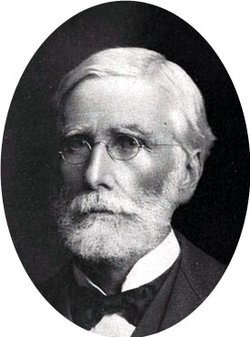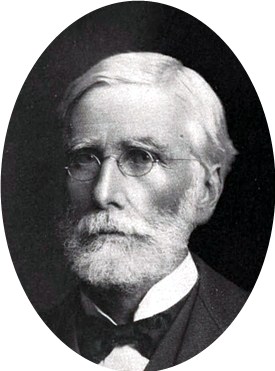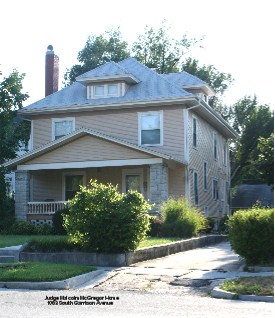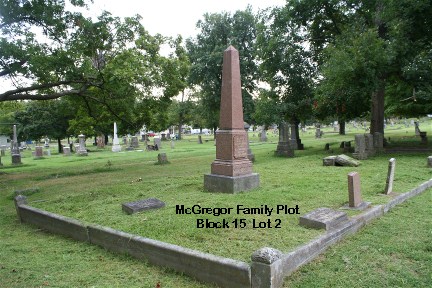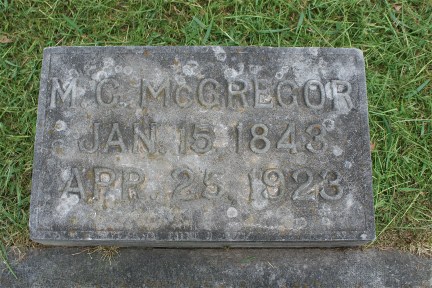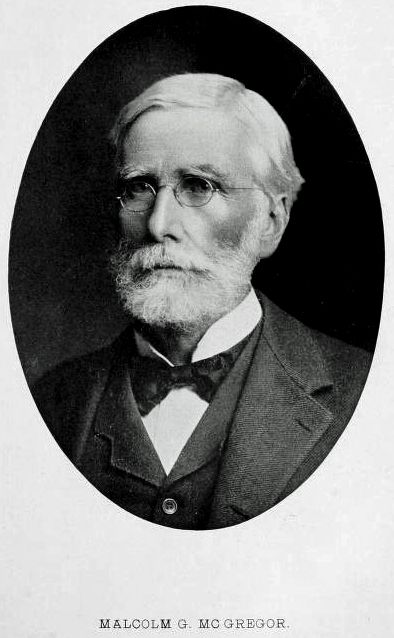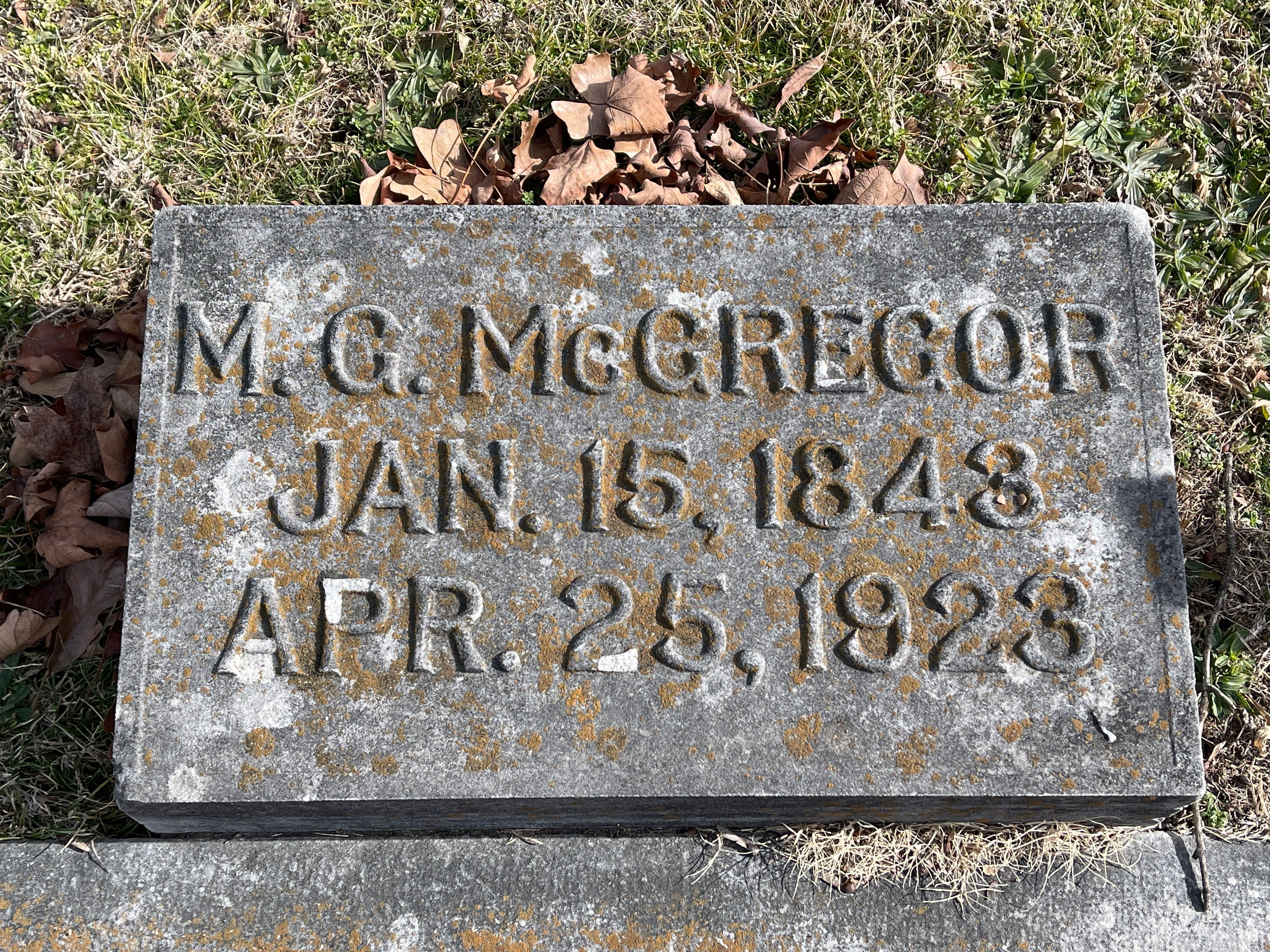JUDGE MCGREGOR SUCCUMBS AFTER BRIEF ILLNESS
END CAME AT HOME ON GARRISON
AT 9:25 LAST NIGHT
__________
PIONEER OF CARTHAGE
__________
Veteran Jurist and Attorney Came Here in 1866 -- Funeral Tomorrow Afternoon
__________
Judge M. G. McGregor is dead. The end came to the veteran Carthage attorney and early day jurist at his home, 1063 South Garrison avenue at 9:25 o'clock last night after a critical illness of only a few days due to pneumonia.
Judge McGregor was 80 years old. His death marks the passing of one of the few remaining prominent settlers of Carthage who came here immediately at the close of the Civil War. He was a most highly esteemed citizen. At the time of his retirement from law practice March 29, 1920, he was the senior member of the Jasper County bar.
A. M. Drake, it is said, is the only surviving Carthage resident who was here when Judge McGregor came to Carthage March 3, 1866, walking from Ft. Scott, Kansas by way of Lamar, a total distance of about 65 miles. The future judge waded Spring River at what was then known as Dawson's ford, where the lower bridge over Spring River now stands.
NO POST OFFICE HERE WHEN HE CAME
Mr. McGregor had been admitted to the bar before Judge John A. S. Putt at Lexington, Missouri, in February. Immediately upon his arrival here he began the practice of law and soon established a good practice. He was active and a leader in all public affairs. At the time of his coming here, no post office had been re-established in Jasper county after the war and he wrote the letter to Washington, that was the means of establishing a post office at Carthage, and procured the appointment of George Rader as postmaster.
When a town school was organized in 1867, he was elected a member of the first board of education and continued to serve as a member of the board almost until his election to the bench in the fall of 1880. He was president of the board at the time of his resignation. That same year he had been elected city attorney but resigned that position too, to accept the circuit judgeship, which he held for two terms, or 12 years. The circuit comprised Jasper, Newton, McDonald and Lawrence counties.
TRIED BALD KNOBBERS
In 1888 he sat as circuit judge at Ozark, Christian county, in the trial of John Matthew, one of the notorious Bald Knobbers, who was convicted of murder and hanged. Judge McGregor could relate many interesting experiences of the early day courts in this section.
MALCOLM GRAEME MCGREGOR was born in Wadsworth, Medina county, Ohio, January 15, 1843, the youngest of nine children. His parents, John and Isabella McGregor were natives of Hamilton, Lanarkshire, Scotland. His father conducted an academy at Wadsworth, becoming and educator of considerable note and prominence.
In 1848 the father died suddenly of heart disease and the widow and youngest son moved to Canton, Ohio, to live with another son and older brother, Archibald McGregor, editor of the Stark County Democrat.
Malcolm McGregor attended the public schools of Canton and soon was old enough to assist in the work of the printing office, his first duty being to deliver papers. A the age of 16 he abandoned the school room entirely to work in the printing office. in the fall of 1863 he went to Maquoketa, Iowa to visit relatives and there taught school two years.
ENTERED LAW OFFICE IN 1865
In the spring of 1865 Mr. McGregor entered the law office of Charles M. Dunbar as a student and that fall went to Kansas City where he continued his preparation for the bar in the office of his brother-in-law, Col. J. W. Jenkins, until his admission to the bar at Lexington just prior to coming to Carthage.
In coming to Carthage Mr. McGregor traveled by stage to Ft. Scott, Kansas in search of a favorable location. On reaching his destination he left his grip at a hotel, for there were no public conveyances to carry him farther and walked first to Lamar, then coming on to Carthage.
Prior to leaving Kansas City, Mr. McGregor had never owned any firearms, but his sister insisted that he should not leave on his trip without buying a revolver, believing that it was a necessary equipment for practicing law in southwestern Missouri in these days. Notwithstanding that he rode over the country horseback and alone and visited other county seats, often collecting large sums of money which he was compelled to carry with him, there being no banks or safes in the country, he was never molested. On his walk from Lamar to Carthage he met only one person on the way -- a man walking like himself but in the opposite direction.
BUT FEW SETTLERS
After leaving Pettis Creek, about five miles south of Lamar, there were two or three farm houses, but after that he passed no other house on the road until reaching the ford of Spring River.
Having walked until about 2 o'clock in the afternoon without anything to eat since an early breakfast he was very hungry. He saw a small log house some distance off on the prairie without any enclosure or any sign to indicate at that distance that it was inhabited, but thinking there might be a chance to get something to eat, he walked to the house and found a woman and some children. The woman prepared him a meal of corn bread and bacon, the only food stuffs which she had. The meal tasted fine to a hungry man, Mr. McGregor said. After partaking of the food and thanking the woman, he continued his walk on into Carthage.
WIFE DIED IN 1882
In May, 1868, he was married to Miss Olive Stephenson of Carthage, and with his wife returned to Kansas City for a visit. The means of travel was in marked contrast to the manner in which Mr. McGregor had made the outward trip, they riding a railroad train from Ft. Scott to Kansas City after driving to the former place.
Mrs. McGregor died in 1882. One daughter, Miss Anna, who made her home with her father here, is the only survivor.
After coming west, Judge McGregor acted with the Republican party but was not a strong partisan.
Besides the surviving daughter Miss Anna, Mr. McGregor had several nieces and nephews.
Mrs. H E. Snyder of Topeka, Kansas has been here since Tuesday
Arch McGregor, of Springfield, a nephew
J. T. Ruffin of Joplin, a brother-in-law of Judge McGregor's wife and his daughter, Miss Alta Ruffin are here from Joplin
A daughter, Mrs. Ora McGregor De Wees died several years ago.
Funeral services will be conducted from the home at 3:30 o'clock tomorrow afternoon. The Rev. Dr. O. J. Carder, pastor of the First Methodist Episcopal Church will have charge.
During his residence here Judge McGregor saw the county grow from a population of perhaps less than a 1,000 people to a county of 90,000 inhabitants, and has witnessed its development from a purely agricultural district more than 100 miles removed from railroads, to one of the richest counties in natural productions in the United States. During his long residence, Judge McGregor stood among the most distinguished and honored citizens of this section, not necessarily because of special prominence in public affairs, but because of his personal qualities which caused fellow citizens to esteem and honor him.
His published memories are found in the following 526 page publication, to wit:
Google Books
The Biographical Record of Jasper County, Missouri
Lewis Publishing Company, 1901
JUDGE MCGREGOR SUCCUMBS AFTER BRIEF ILLNESS
END CAME AT HOME ON GARRISON
AT 9:25 LAST NIGHT
__________
PIONEER OF CARTHAGE
__________
Veteran Jurist and Attorney Came Here in 1866 -- Funeral Tomorrow Afternoon
__________
Judge M. G. McGregor is dead. The end came to the veteran Carthage attorney and early day jurist at his home, 1063 South Garrison avenue at 9:25 o'clock last night after a critical illness of only a few days due to pneumonia.
Judge McGregor was 80 years old. His death marks the passing of one of the few remaining prominent settlers of Carthage who came here immediately at the close of the Civil War. He was a most highly esteemed citizen. At the time of his retirement from law practice March 29, 1920, he was the senior member of the Jasper County bar.
A. M. Drake, it is said, is the only surviving Carthage resident who was here when Judge McGregor came to Carthage March 3, 1866, walking from Ft. Scott, Kansas by way of Lamar, a total distance of about 65 miles. The future judge waded Spring River at what was then known as Dawson's ford, where the lower bridge over Spring River now stands.
NO POST OFFICE HERE WHEN HE CAME
Mr. McGregor had been admitted to the bar before Judge John A. S. Putt at Lexington, Missouri, in February. Immediately upon his arrival here he began the practice of law and soon established a good practice. He was active and a leader in all public affairs. At the time of his coming here, no post office had been re-established in Jasper county after the war and he wrote the letter to Washington, that was the means of establishing a post office at Carthage, and procured the appointment of George Rader as postmaster.
When a town school was organized in 1867, he was elected a member of the first board of education and continued to serve as a member of the board almost until his election to the bench in the fall of 1880. He was president of the board at the time of his resignation. That same year he had been elected city attorney but resigned that position too, to accept the circuit judgeship, which he held for two terms, or 12 years. The circuit comprised Jasper, Newton, McDonald and Lawrence counties.
TRIED BALD KNOBBERS
In 1888 he sat as circuit judge at Ozark, Christian county, in the trial of John Matthew, one of the notorious Bald Knobbers, who was convicted of murder and hanged. Judge McGregor could relate many interesting experiences of the early day courts in this section.
MALCOLM GRAEME MCGREGOR was born in Wadsworth, Medina county, Ohio, January 15, 1843, the youngest of nine children. His parents, John and Isabella McGregor were natives of Hamilton, Lanarkshire, Scotland. His father conducted an academy at Wadsworth, becoming and educator of considerable note and prominence.
In 1848 the father died suddenly of heart disease and the widow and youngest son moved to Canton, Ohio, to live with another son and older brother, Archibald McGregor, editor of the Stark County Democrat.
Malcolm McGregor attended the public schools of Canton and soon was old enough to assist in the work of the printing office, his first duty being to deliver papers. A the age of 16 he abandoned the school room entirely to work in the printing office. in the fall of 1863 he went to Maquoketa, Iowa to visit relatives and there taught school two years.
ENTERED LAW OFFICE IN 1865
In the spring of 1865 Mr. McGregor entered the law office of Charles M. Dunbar as a student and that fall went to Kansas City where he continued his preparation for the bar in the office of his brother-in-law, Col. J. W. Jenkins, until his admission to the bar at Lexington just prior to coming to Carthage.
In coming to Carthage Mr. McGregor traveled by stage to Ft. Scott, Kansas in search of a favorable location. On reaching his destination he left his grip at a hotel, for there were no public conveyances to carry him farther and walked first to Lamar, then coming on to Carthage.
Prior to leaving Kansas City, Mr. McGregor had never owned any firearms, but his sister insisted that he should not leave on his trip without buying a revolver, believing that it was a necessary equipment for practicing law in southwestern Missouri in these days. Notwithstanding that he rode over the country horseback and alone and visited other county seats, often collecting large sums of money which he was compelled to carry with him, there being no banks or safes in the country, he was never molested. On his walk from Lamar to Carthage he met only one person on the way -- a man walking like himself but in the opposite direction.
BUT FEW SETTLERS
After leaving Pettis Creek, about five miles south of Lamar, there were two or three farm houses, but after that he passed no other house on the road until reaching the ford of Spring River.
Having walked until about 2 o'clock in the afternoon without anything to eat since an early breakfast he was very hungry. He saw a small log house some distance off on the prairie without any enclosure or any sign to indicate at that distance that it was inhabited, but thinking there might be a chance to get something to eat, he walked to the house and found a woman and some children. The woman prepared him a meal of corn bread and bacon, the only food stuffs which she had. The meal tasted fine to a hungry man, Mr. McGregor said. After partaking of the food and thanking the woman, he continued his walk on into Carthage.
WIFE DIED IN 1882
In May, 1868, he was married to Miss Olive Stephenson of Carthage, and with his wife returned to Kansas City for a visit. The means of travel was in marked contrast to the manner in which Mr. McGregor had made the outward trip, they riding a railroad train from Ft. Scott to Kansas City after driving to the former place.
Mrs. McGregor died in 1882. One daughter, Miss Anna, who made her home with her father here, is the only survivor.
After coming west, Judge McGregor acted with the Republican party but was not a strong partisan.
Besides the surviving daughter Miss Anna, Mr. McGregor had several nieces and nephews.
Mrs. H E. Snyder of Topeka, Kansas has been here since Tuesday
Arch McGregor, of Springfield, a nephew
J. T. Ruffin of Joplin, a brother-in-law of Judge McGregor's wife and his daughter, Miss Alta Ruffin are here from Joplin
A daughter, Mrs. Ora McGregor De Wees died several years ago.
Funeral services will be conducted from the home at 3:30 o'clock tomorrow afternoon. The Rev. Dr. O. J. Carder, pastor of the First Methodist Episcopal Church will have charge.
During his residence here Judge McGregor saw the county grow from a population of perhaps less than a 1,000 people to a county of 90,000 inhabitants, and has witnessed its development from a purely agricultural district more than 100 miles removed from railroads, to one of the richest counties in natural productions in the United States. During his long residence, Judge McGregor stood among the most distinguished and honored citizens of this section, not necessarily because of special prominence in public affairs, but because of his personal qualities which caused fellow citizens to esteem and honor him.
His published memories are found in the following 526 page publication, to wit:
Google Books
The Biographical Record of Jasper County, Missouri
Lewis Publishing Company, 1901
Family Members
Sponsored by Ancestry
Advertisement
Explore more
Sponsored by Ancestry
Advertisement
